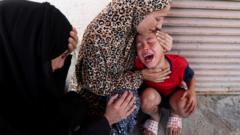Doctors at Nasser Medical Complex sound alarms over life-threatening fuel shortages threatening critical care services amidst escalating conflict.
**Gaza's Nasser Hospital on Brink of Collapse Amid Fuel Crisis and Intensifying Military Action**

**Gaza's Nasser Hospital on Brink of Collapse Amid Fuel Crisis and Intensifying Military Action**
As Israel expands its military offensive, warnings of a humanitarian disaster emerge from Gaza's largest hospital.
The Nasser Medical Complex, Gaza's largest active hospital, is nearing collapse as relentless military operations intensify amid severe fuel shortages. Medical professionals have voiced urgent concerns about the facility's ability to maintain life-saving operations, especially in the face of an expanding Israeli ground offensive near Khan Younis.
On Thursday, the hospital ceased admitting new patients due to these urgent circumstances, as Israeli troops reportedly moved within 200 meters of the complex, engaging nearby shelters for the displaced. Following an initial advance, the forces retreated after digging up strategic areas, which heavily impacted the proximity of hostilities to the hospital.
The dire situation within the hospital has left many medical staff and critically ill patients isolated and increasingly anxious as artillery strikes disrupted the surrounding areas. With power generators running low on fuel, hospital authorities warned that electrical outages could occur, threatening the lives of patients reliant on ventilators.
Reports state that while approximately 160,000 liters of fuel have been dispatched to Gaza's medical establishments recently, the distribution logistics fall beyond the Israeli military's responsibility, exacerbating the critical situation affecting the hospital facilities. This shortage comes as the hospital itself grapples with more than double its capacity of patients—700 individuals occupying a space designed for 350—with healthcare workers striving around the clock to tend to escalating trauma cases.
Among the severe injuries reported, many involve children who have come under fire while trying to access emergency aid supplies. A recent airstrike near an aid distribution zone resulted in the tragic deaths of ten civilians who were seeking food. The civilian toll since the outbreak of conflict on October 7 has surged to alarming numbers, with reports indicating over 57,000 fatalities in Gaza alone as hostilities progress.
North of the hospital, additional violence was reported as an Israeli airstrike targeted a school sheltering the displaced, resulting in the deaths of multiple individuals, including a prominent Hamas commander. Meanwhile, continued reports suggest that negotiations for a new ceasefire could be imminent, though various sticking points persist, including ongoing troop deployments and aid distribution logistics.
As the humanitarian crisis deepens, the fears within Nasser Medical Complex grow—medical staff urgently await significant intervention and aid, voicing their sentiments about the precariousness of their situation, stating, "We are closer to death than to life."
On Thursday, the hospital ceased admitting new patients due to these urgent circumstances, as Israeli troops reportedly moved within 200 meters of the complex, engaging nearby shelters for the displaced. Following an initial advance, the forces retreated after digging up strategic areas, which heavily impacted the proximity of hostilities to the hospital.
The dire situation within the hospital has left many medical staff and critically ill patients isolated and increasingly anxious as artillery strikes disrupted the surrounding areas. With power generators running low on fuel, hospital authorities warned that electrical outages could occur, threatening the lives of patients reliant on ventilators.
Reports state that while approximately 160,000 liters of fuel have been dispatched to Gaza's medical establishments recently, the distribution logistics fall beyond the Israeli military's responsibility, exacerbating the critical situation affecting the hospital facilities. This shortage comes as the hospital itself grapples with more than double its capacity of patients—700 individuals occupying a space designed for 350—with healthcare workers striving around the clock to tend to escalating trauma cases.
Among the severe injuries reported, many involve children who have come under fire while trying to access emergency aid supplies. A recent airstrike near an aid distribution zone resulted in the tragic deaths of ten civilians who were seeking food. The civilian toll since the outbreak of conflict on October 7 has surged to alarming numbers, with reports indicating over 57,000 fatalities in Gaza alone as hostilities progress.
North of the hospital, additional violence was reported as an Israeli airstrike targeted a school sheltering the displaced, resulting in the deaths of multiple individuals, including a prominent Hamas commander. Meanwhile, continued reports suggest that negotiations for a new ceasefire could be imminent, though various sticking points persist, including ongoing troop deployments and aid distribution logistics.
As the humanitarian crisis deepens, the fears within Nasser Medical Complex grow—medical staff urgently await significant intervention and aid, voicing their sentiments about the precariousness of their situation, stating, "We are closer to death than to life."





















